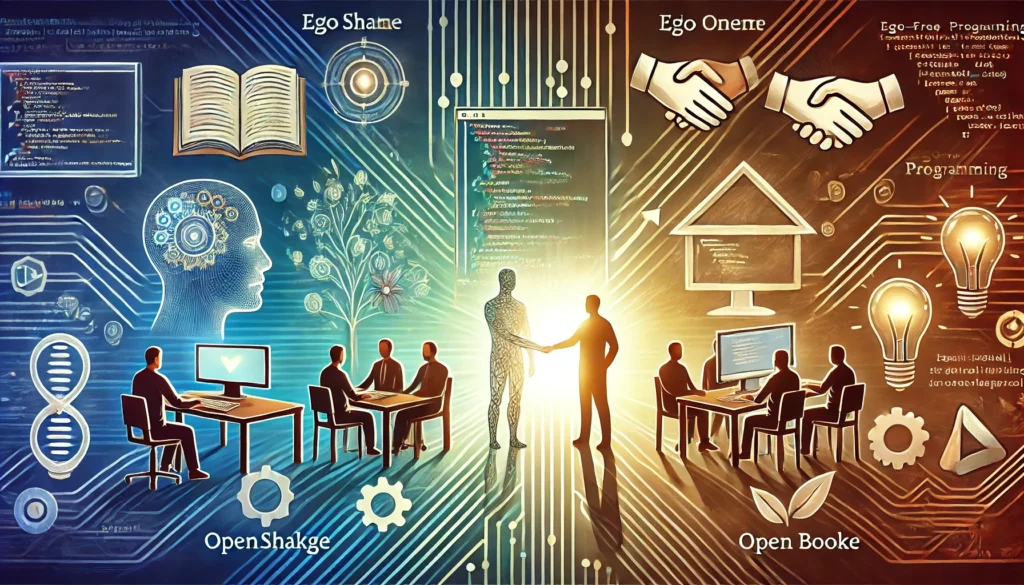From code crusaders to collaborative coding, the developer reflects on the ego trap and essential lessons learned. An experienced programmer shares a candid look at the pitfalls of ego in the tech world, highlighting the crucial shift from individual brilliance to the power of humility and collaboration. Inspired by Yoan Thirion’s ‘10 Commandments of Ego-Free Programming’, this reflection offers invaluable insights for developers at all levels.
For many developers, the early days are often fuelled by a sense of mastery over lines of code, the feeling of overcoming complex challenges alone. But as an experienced programmer now fully understands, technical prowess is only one facet of a successful and fulfilling career. In a revealing reflection, the author recounts his journey through the ‘ego trap’, a common experience where individual success can overshadow the vital importance of humility and teamwork. This personal account highlights a fundamental truth often learned the hard way: in the collaborative landscape of software development, the ability to learn, share and work effectively with others outweighs individual brilliance every time. Drawing on Yoan Thirion’s insightful ‘10 Commandments of Ego-Free Programming’, the author regrets not adopting these principles from the outset, offering a valuable roadmap for developers looking to progress beyond simply writing code.
🚀 The 10 Commandments of Ego-Free Programming
- Accept that you will make mistakes
Bad code? Learn the right lessons, because mistakes are an essential driver of growth for developers. In software development, mistakes are inevitable, but far from being a fatality, they are an essential driver of growth. Effective developers assume that they will produce bad code and concentrate their efforts on detecting and proactively correcting it. This acceptance of initial imperfection nurtures a growth mentality that is essential in a constantly evolving sector. Every bug then becomes a learning opportunity, encouraging people to question assumptions and explore innovative solutions. By transforming the fear of failure into a signal for improvement, developers strengthen their technical resilience and cultivate a humility that is essential for collaboration and career progression.
- You are not your code
‘Software is made to be modified, rewritten, and discarded. You’re not.’ Knowing how to distinguish between technical criticism and personal attack is the key to growth. In the world of software development, where code is by nature fluid and evolving (‘software is made to be modified, rewritten, and discarded’), it’s crucial to distinguish constructive technical criticism from a personal attack. Imperfect code is not a reflection of diminished personal value, but rather a starting point for improvement. By understanding that code is a tool detachable from its creator, developers can welcome feedback with an open mind, encouraging continuous learning and more effective collaboration, where the common goal is the quality of the software, not the validation of individual egos.
- Someone will always know more
‘No matter how good you are at ‘karate’, someone else will always know more.’ In software development, the recognition that there will always be superior expertise is essential. Humility then becomes a strength, encouraging help-seeking and openness to learning from everyone, including beginners. This posture fosters a collaborative environment where knowledge is shared, valued and mutually enriched, propelling individual and collective growth.
- Don’t rewrite code without consultation
Collaboration and context are key to Effective Improvement of Existing Code. Before rewriting code, it is essential to understand its context and the reasons for its design. Collaboration and engagement in discussion provide this crucial perspective, avoiding unnecessary refactoring and promoting informed improvements that respect the original work.
- Treat others with respect and patience
Respect and collaboration are essential human factors for success. Human relations are the foundation of teamwork in software development. Mutual respect, beyond mere consideration, is a key driver of creativity and productivity, as it fosters a positive and collaborative working environment.
- Accept change
Given the constant evolution of software, adaptability and flexibility are essential qualities. Embracing change is the key to successfully navigating a dynamic technological environment and turning challenges into opportunities.
- True authority comes from knowledge
Beyond the title, a developer’s value lies in action. In the field of software development, where hierarchy exists, it is crucial to remember that true respect within a team cannot be derived from a simple title or position. The moment a position becomes the sole basis of consideration received marks a loss for team spirit. Lasting and meaningful respect is earned through concrete actions, demonstrated skills and effective contribution to the project, not through formal authority. Leaders and team members who embody this truth cultivate an environment where everyone’s value is recognised beyond their title.
- Fight for your ideas, but accept defeat
Disagreements are natural, but team unity is essential. After a constructive debate, supporting the collective decision, even if it differs from your initial opinion, allows you to move forward together towards a common goal.
- Don’t be ‘the guy in the room‘
Software development is a collaborative endeavour, not a solitary job. Active communication, participation and collaboration with colleagues are essential to the success of a team and the delivery of quality software.
- Criticise the code, not the people
Code criticism should be objective and benevolent, focusing on the software and not the person. Distinguishing the code from its author fosters a positive learning environment and helps to improve the overall quality of the software.
In conclusion, humility is the key to successful and collaborative development. Adopting these principles has enabled me to become not only a better developer, but also a better collaborator. By putting your ego aside, you’ll create stronger relationships, more effective teamwork and better quality code. Which commandment do you find hardest to apply? Share your experience in the comments! 🚀



